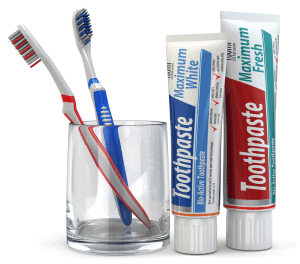
Teenage Bad Breath Halitosis
Teenage bad breath (halitosis) is a common dental problem. Teenagers are at a stage in their lives where they rely heavily on how they are perceived by others. Most are eager to take steps to avoid bad breath, but it can be an overwhelming obstacle for some teenagers.
Causes of halitosis in teenagers
Bad breath in teenagers can be caused by many factors. Identifying the cause of halitosis can often help with prevention and treatment. Common causes include:
- Poor dental hygiene: The most common cause of halitosis is a failure to practice good dental hygiene. When teeth are not brushed and flossed often, odor causing bacteria build up and breed on the tongue, in between teeth, and in untreated cavities.
- Bacterial infections: Infections of the nose, sinuses, tonsils and gums can cause bad breath.
- Postnasal drip: Often allergies, colds and sinus infections lead to the production of excess mucous that runs down the back of the throat.
- Certain foods: Foods like onions, garlic and spices can leave lasting odors in the mouth long after consumption. They are even absorbed into the bloodstream and the odors are then expelled through the lungs.
- Dry mouth: Saliva is needed to wash away bacteria in the mouth. When there is not enough the mouth becomes dry and bacteria can build up. Dry mouth occur from mouth breathing, or it can be a caused by certain health problems or medications.
- Medications: Hundreds of medications cause dry mouth. The most common are drugs used to treat depression, anxiety and nerve pain. Over the counter antihistamines, decongestants and pain medications can also leave the mouth dry.
- Tobacco use: Smoking tobacco and chewing tobacco products is known to cause bad breath, and quitting the habit is imperative.
Preventing halitosis in teenagers
The following recommendations can be extremely effective for treating bad breath in most teenagers.
- Make good oral hygiene a priority: This is the best way to prevent bad breath. Brush and floss twice a day and after meals when possible. Be sure to brush your tongue, cheeks and the roof of your mouth in addition to the teeth.
- Use antibacterial mouthwash: Rinsing with an antibacterial mouthwash once or twice a day kills the bacteria that causes breath and promotes healthier teeth and gums.
- Chew sugar-free gum: Chewing sugar-free gum can help clean the teeth between brushings and prevent dry mouth. Regular gum contains sugar that can promote bacteria buildup, so be sure to choose a sugar-free option.
- Avoid sugary food: Bacteria love foods that are high in sugar and stick to the teeth. Healthy food choices are better for overall dental health.
- Drink water: Staying hydrated prevents dry mouth, and drinking plenty of water washes away food particles and bacteria.
- Carefully clean orthodontic appliances: Don’t forget about retainers and removable orthodontic appliances. These need to be cleaned often and thoroughly. Also take special care to properly clean around braces where food particles can become trapped.
- Visits to dentist regularly: Professional cleanings every 6 months and prompt treatment of cavities can significantly improve and prevent bad breath.
Sometimes bad breath can be cause by an underlying dental or medical condition. Be sure and speak with Drs. Rubin or Sentelle about any concerns regarding halitosis to ensure proper diagnosis and treatment. Schedule an appointment by contacting our office via our Online Appointment Request or call 214 618 5200.
